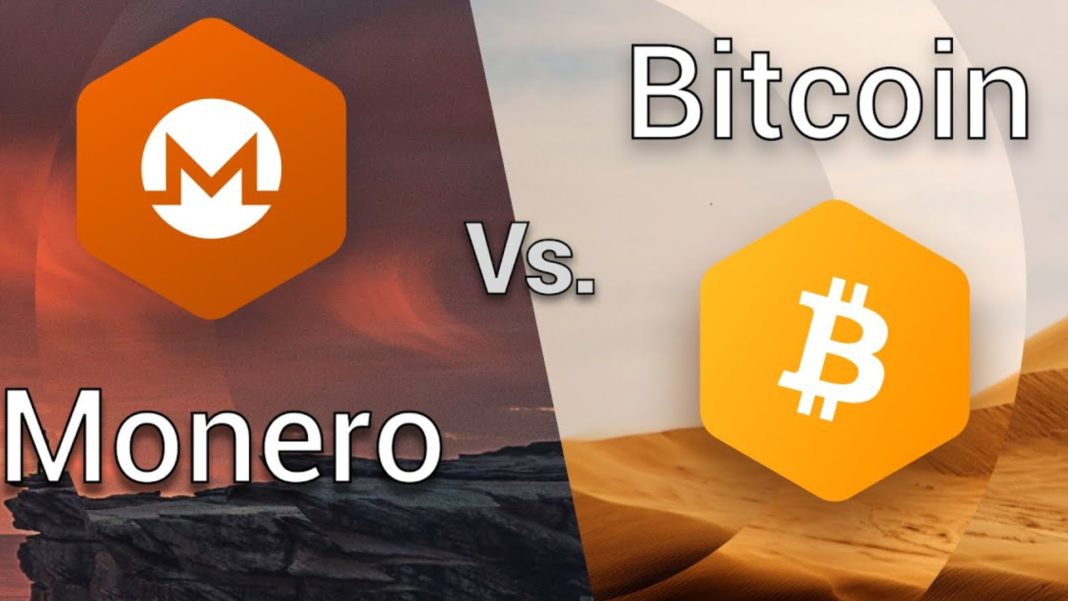Cryptocurrencies have revolutionized the world of finance, offering decentralized and secure digital transactions. Among the numerous cryptocurrencies available today, Monero (XMR) and Bitcoin (BTC) are two prominent contenders. In this article, we will delve deep into the comparison between Monero and BTC, analyzing their key features, functionalities, and market positions. Join us as we explore the fascinating realm of Monero vs BTC and understand their respective strengths and weaknesses.
Monero vs BTC: The Basics
What is Monero?
Monero, often referred to as the “privacy coin,” is a cryptocurrency that prioritizes user anonymity and transactional privacy. Launched in 2014, Monero employs innovative technologies, including ring signatures, stealth addresses, and confidential transactions, to obfuscate sender, receiver, and transaction data. This focus on privacy has made Monero a popular choice among individuals valuing financial confidentiality.
What is Bitcoin?
Bitcoin, the pioneering cryptocurrency, needs no introduction. Created in 2009, Bitcoin brought the concept of decentralized digital currency into the mainstream. As the first cryptocurrency to gain widespread adoption, Bitcoin paved the way for the development of thousands of other digital assets. It operates on a public ledger called the blockchain and relies on cryptographic algorithms to secure transactions.
Monero vs BTC: Features and Functionality
In this section, we will explore the features and functionality of Monero and Bitcoin, highlighting the factors that set them apart.
Transaction Privacy and Anonymity
Monero’s Focus on Privacy
Monero stands out for its emphasis on transactional privacy. By utilizing ring signatures, Monero conceals the actual sender in a group of possible senders, making it nearly impossible to trace the origin of a transaction. Additionally, stealth addresses generate unique, one-time addresses for each transaction, rendering it difficult to link the sender and receiver. Moreover, confidential transactions ensure that the transaction amount remains hidden.
Bitcoin’s Pseudonymity
While Bitcoin transactions are not entirely anonymous, they provide a level of pseudonymity. Bitcoin addresses do not reveal personal information, but all transactions and associated addresses are publicly recorded on the blockchain. Although it is possible to link addresses to individuals through various means, Bitcoin users can employ additional privacy measures, such as using multiple addresses and mixing services, to enhance anonymity.
Scalability and Transaction Speed
Monero’s Scalability Challenges
Monero faces scalability challenges due to its focus on privacy. The inclusion of privacy features increases transaction size and computational requirements, impacting scalability. However, ongoing development efforts, such as the implementation of Bulletproofs and the upcoming Monero Improvement Protocols, aim to enhance scalability while maintaining privacy.
Bitcoin’s Scaling Solutions
Bitcoin has faced scalability issues as well, with its original blockchain size and limited block capacity. However, various scaling solutions have been proposed and implemented, including the Lightning Network and Segregated Witness (SegWit). These solutions aim to improve transaction throughput and reduce fees by enabling off-chain transactions and optimizing block space.
Mining Algorithm and Centralization
Monero’s ASIC-Resistant Algorithm
Monero employs an ASIC-resistant mining algorithm called RandomX, which promotes decentralized mining. By design, RandomX allows CPUs (Central Processing Units) to effectively mine Monero while rendering specialized mining hardware, such as ASICs (Application-Specific Integrated Circuits), inefficient. This algorithmic choice aims to maintain a fair and egalitarian mining landscape.
Bitcoin’s ASIC Dominance
Bitcoin, on the other hand, primarily relies on ASIC mining, which has led to the concentration of mining power among large mining pools and hardware manufacturers. The specialized nature of ASICs makes it challenging for individual miners to compete, raising concerns about centralization. However, the Bitcoin community continues to explore ways to address this issue and promote decentralization.
Fungibility and Trackability
Monero’s Fungibility
Monero offers a high level of fungibility, meaning that each coin is interchangeable and indistinguishable from another. Due to its privacy features, Monero coins do not carry a transaction history or “taint.” This fungibility ensures that all units of Monero are equal and can be exchanged without concerns of blacklisting or prejudiced history.
Bitcoin’s Trackability Challenges
Bitcoin, despite its popularity, struggles with fungibility due to the transparent nature of its blockchain. Every transaction and associated address is publicly visible, making it possible to trace the transaction history of each Bitcoin. This traceability can potentially lead to “tainted” coins that may be refused by certain entities. While various techniques and privacy solutions exist to mitigate this issue, Bitcoin’s fungibility remains a topic of discussion.

Community and Development
Monero’s Strong Community
Monero boasts a vibrant and committed community that actively contributes to its development. The community-driven nature of Monero ensures continuous improvement, with regular updates and bug fixes. The developers prioritize user feedback and employ a transparent decision-making process, fostering a sense of ownership and inclusivity within the community.
Bitcoin’s Extensive Development Ecosystem
Bitcoin’s development ecosystem is vast and diverse. With a significant market share and widespread adoption, Bitcoin attracts numerous developers, researchers, and businesses. This broad involvement has led to the creation of various Bitcoin improvement proposals (BIPs) and the establishment of multiple development teams. The community-driven development process of Bitcoin contributes to its resilience and adaptability.
Conclusion
In the battle of Monero vs BTC, both cryptocurrencies possess unique features and functionalities that cater to diverse user needs. Monero’s emphasis on transactional privacy and fungibility provides a secure and confidential medium of exchange, appealing to individuals valuing financial confidentiality. Bitcoin, as the pioneering cryptocurrency, offers widespread adoption, a robust development ecosystem, and improved scalability solutions.
As the cryptocurrency landscape continues to evolve, the choice between Monero and Bitcoin ultimately depends on individual preferences, intended use cases, and risk tolerance. Whether you prioritize privacy or seek a more established and recognized digital asset, both Monero and Bitcoin offer exciting opportunities in the world of decentralized finance.
Frequently Asked Questions (FAQs)
Q1: Is Monero more private than Bitcoin?
A1: Yes, Monero offers a higher level of privacy than Bitcoin. Monero’s privacy features, including ring signatures, stealth addresses, and confidential transactions, significantly obfuscate transactional details, making it harder to trace the origin and destination of funds.
Q2: Can Monero be used for illegal activities?
A2: While Monero’s privacy features provide enhanced transactional anonymity, the technology itself is not inherently tied to illegal activities. Similar to cash, cryptocurrencies like Monero can be used for both lawful and unlawful purposes. It is important to recognize that privacy is a fundamental aspect of financial freedom, and Monero’s focus on privacy caters to individuals valuing confidentiality.
Q3: Is Bitcoin more widely accepted than Monero?
A3: Yes, Bitcoin enjoys broader acceptance and adoption compared to Monero. Bitcoin has been around for a longer time, gaining recognition as the first cryptocurrency and paving the way for the development of the entire cryptocurrency ecosystem. However, Monero has also achieved significant adoption and is accepted by numerous online merchants and platforms.
Q4: Which cryptocurrency offers better scalability, Monero, or Bitcoin?
A4: Both Monero and Bitcoin face scalability challenges, but Bitcoin has implemented various scaling solutions like the Lightning Network and SegWit to improve throughput. Monero, with its focus on privacy, encounters scalability issues due to the increased computational requirements of privacy features. However, ongoing development efforts aim to enhance scalability for both cryptocurrencies.
Q5: Can Monero and Bitcoin coexist?
A5: Absolutely! Monero and Bitcoin serve different purposes in the cryptocurrency space. While Bitcoin focuses on establishing a decentralized, transparent, and secure digital currency, Monero prioritizes transactional privacy and fungibility. These distinct features make both cryptocurrencies valuable in their respective domains, allowing them to coexist and cater to different user preferences.
Q6: Which cryptocurrency is a better investment, Monero, or Bitcoin?
A6: Deciding between Monero and Bitcoin as an investment depends on various factors, including personal risk tolerance, investment goals, and market analysis. Bitcoin, being the first and most recognized cryptocurrency, has a larger market cap and wider adoption. Monero, with its focus on privacy, offers unique features that may appeal to privacy-conscious individuals. It is essential to conduct thorough research, seek professional advice, and diversify investments to make informed decisions.


